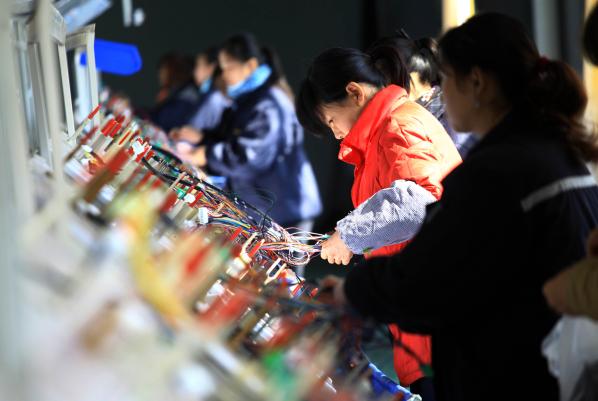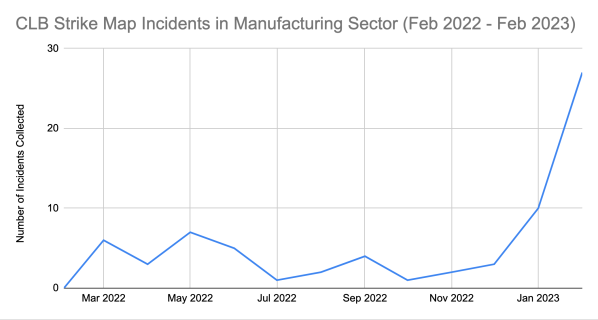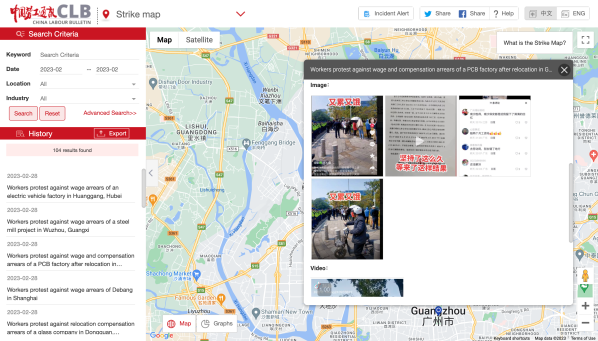
Photograph: humphery / Shutterstock.com
CLB’s February 2023 mapping data shows an increase in incidents in the manufacturing sector. Manufacturing is one to keep an eye on, with factory shutdowns, closures, relocations, and other struggles related to China’s overall economy and a drop in purchase orders from overseas.
But first, don’t miss the content CLB has published recently:
- Three-child policy and increased maternity leave implementation in the workplace at odds in workers’ experience. In this investigation published on International Women’s Day, CLB identified three cases of workers’ rights violations related to the employment right of maternity leave and called the official trade unions relevant to each case. Our findings reveal that the union defaults on its dual duties to assist women workers facing unenforced policy abuses at the workplace level, and to uphold state policy on encouraging more births.
- Jiangsu labour department calls courier's alert about wage arrears a “false complaint” against subcontractor. As part of CLB’s series on platform economy workers, we investigated the case of a package courier who posted on a government message board that he was owed wages by the local delivery hub and was made to register as a “self-employed worksite” that should invoice the company to receive pay. He asked the authorities to resolve this systemic issue in the courier industry. The government responded by identifying which legal entity owed the wages and ensured the worker was paid, but not before chiding the worker for filing a “false complaint” against the wrong entity. Complex labour relationships make it difficult for workers and enforcement authorities to implement China’s labour laws and regulations, letting businesses off the hook at the expense of workers.
- Former worker at Dongguan electronics factory kills three, sparking discussion about agency labour in China. In this incident, the migrant worker stabbed three men outside of the Dongguan Best Travel Electronics factory and surrendered to police. This was most likely rooted in a labour dispute, and online comments pointed to the widespread problems of agency labour in China. In this article, CLB takes a look at how China’s 2008 Labour Contract Law backfired and made agency labour prevalent, leading to increased vulnerability of migrant workers. The current context is that agency labour has filled the gaps in the recent manufacturing labour shortage.
- Coal mine collapse in Inner Mongolia kills five, injures six, and leaves dozens missing. On 22 February, a coal mine collapsed in Inner Mongolia, and a search and rescue operation for dozens of missing workers ensued. CLB analysed our Accident Map data since 2014 to find that coal mining accidents have become less severe over time, but they still account for a significant portion of all accidents we record. CLB calls on China’s official trade union to better monitor workplace safety and enable frontline workers to raise their voices about unsafe conditions before accidents occur, in line with provisions of China’s Work Safety Law.
- Workers’ rights in Hong Kong: A chat with the Association for Rights of Industrial Accident Victims. CLB sat down with Siu Sin-Man of the Association for the Rights of Industrial Accident Victims to talk about the changing landscape for labour rights in Hong Kong, through the case studies of three major incidents in 2022: The Sau Mau Ping construction site accident, the Mirror concert accident, and Foodpanda delivery riders’ strikes. In her interview, Siu urges for greater government transparency in accident investigations, tougher laws against employers who violate workers’ rights, and a stronger voice in Hong Kong’s Legislative Council to represent workers’ interests. This article is based on our Chinese-language podcast episode featuring our full interview with Siu, conducted in late December 2022.
- February 2023 labour news roundup: Retirement, social security, and health insurance for China’s older workers. In this edition: Retirees protest against changes to the public health insurance system; a proposal for gradually delaying the legal retirement age to 65 faces public criticism; and a national “work for relief” program is implemented on state-invested infrastructure projects.
Workers protest in Guangdong province against factory shutdowns and relocations
Collective actions in the manufacturing industry accounted for over one-quarter of the 104 incidents gathered in our Strike Map last month. Out of the 27 collective actions of workers in the manufacturing industry, these were concentrated in Guangdong province, with 18 occurring there. Among those, ten cases were in the electronics industry, four in the garment industry, and four cases in other industries.


